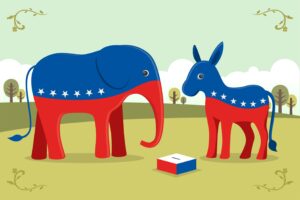
(Editor’s note: This post originally ran in June, but we thought it was worth a second look on the eve of the election.)
As Americans approach the elections this November, discussions of what influences economic and political preferences will surely flood our television sets and news feeds. Pundits use factors like income, gender, and education level to make predictions on how people will vote.
Genetics and Politics
But do they ever consider genetics in making their predictions? Probably not. A new study, however, suggests that such preferences may indeed be influenced by our genetic makeup.
Led by Daniel Benjamin of Cornell University and Peter Visscher of the University of Queensland a team of researchers studied 3,200 individuals for four traits believed to influence economic preferences (risk-aversion, patience, trust, and fair-mindedness), as well as five categories of political preferences (immigration/crime, economic policy, environmentalism, feminism/equality, and foreign policy). Each individual’s preferences in these areas were determined using an extensive survey. The results of the study were published in the Proceedings of the National Academy of Sciences in May.
Technical note:
Heritability is a common measure of the average influence genetics has on a trait relative to other, non-genetic influences in a population.The heritability of a trait can range from zero (variance in the trait is independent of genetics) to one (variance in the trait completely explained by genetics). Heritability is often estimated using using twin studies; if identical twins are, on average, more similar than fraternal twins in a given trait, this increase in similarity is attributed to shared genetics.
The Visscher team, however, used a newer method for estimating heritability that relies on the genetically-determined relatedness of study subjects, which is potentially more accurate. The heritability estimates generated by this method were noisy, but three of the nine traits had statistically-significant heritability estimates: trust (heritability = 24%, p-value = 0.05), foreign policy (heritability = 35%, p-value = 0.01), and economic policy (heritability = 34%, p-value = 0.01). Despite the noisiness, the heritability estimates are not inconsistent with earlier findings from twin-designed studies (after for accounting for the biases in the two estimation methods).
Trust and Economic Policy
Before asking which genes are involved, we have to ask: are genes involved in economic and political preference, or are these preferences solely determined by environmental factors, such as family and friends? Three of the nine traits Benjamin and Visscher’s team analyzed appeared to be heritable to some extent — trust, foreign policy, and economic policy — which is consistent with previous studies.
Although Visscher and his fellow researchers were able to establish that genetics likely influences some aspects of our economic and political preferences, they were not able to determine which genes or genetic variants may be involved.
Many Genes
Visscher and his co-workers conclude that economic and political preferences are, most likely, influenced by many different genes, each affecting these traits in very small ways. In order to capture such small effects, much larger sample sizes are needed. Thus, economic and political preferences, along with the canonical examples of height and schizophrenia, fall into a group of very complex traits that are heritable but for which we may never find one single gene as the “smoking gun.”
If you’re voting in today’s primaries in California, Montana, New Jersey, New Mexico, or South Dakota, it’s likely that genetic influences are with you in the voting booth. Which genes are involved in economic and political preferences, however, remains to be discovered. Perhaps by the 2016 election we’ll better understand the genetics of politics.



